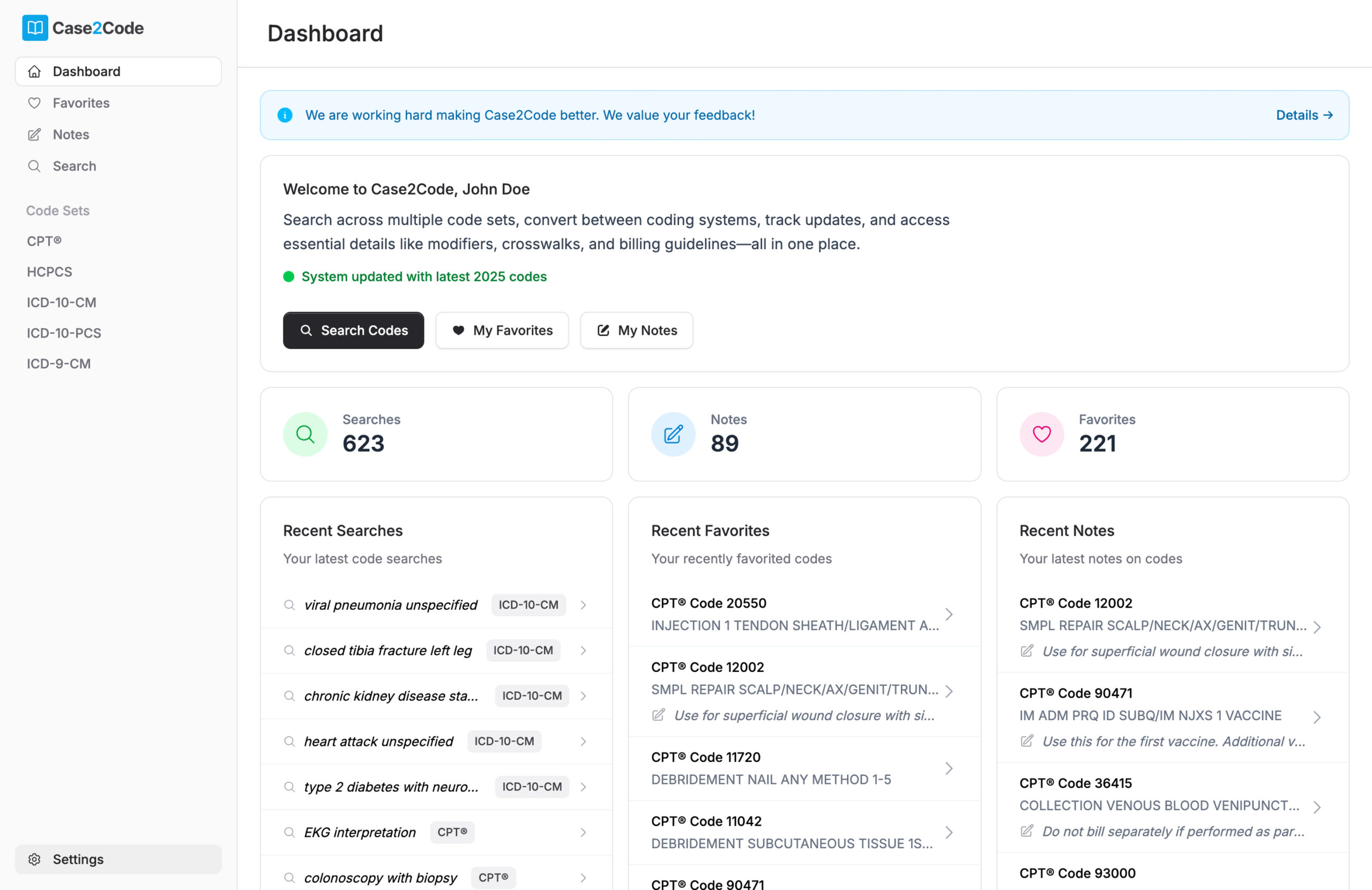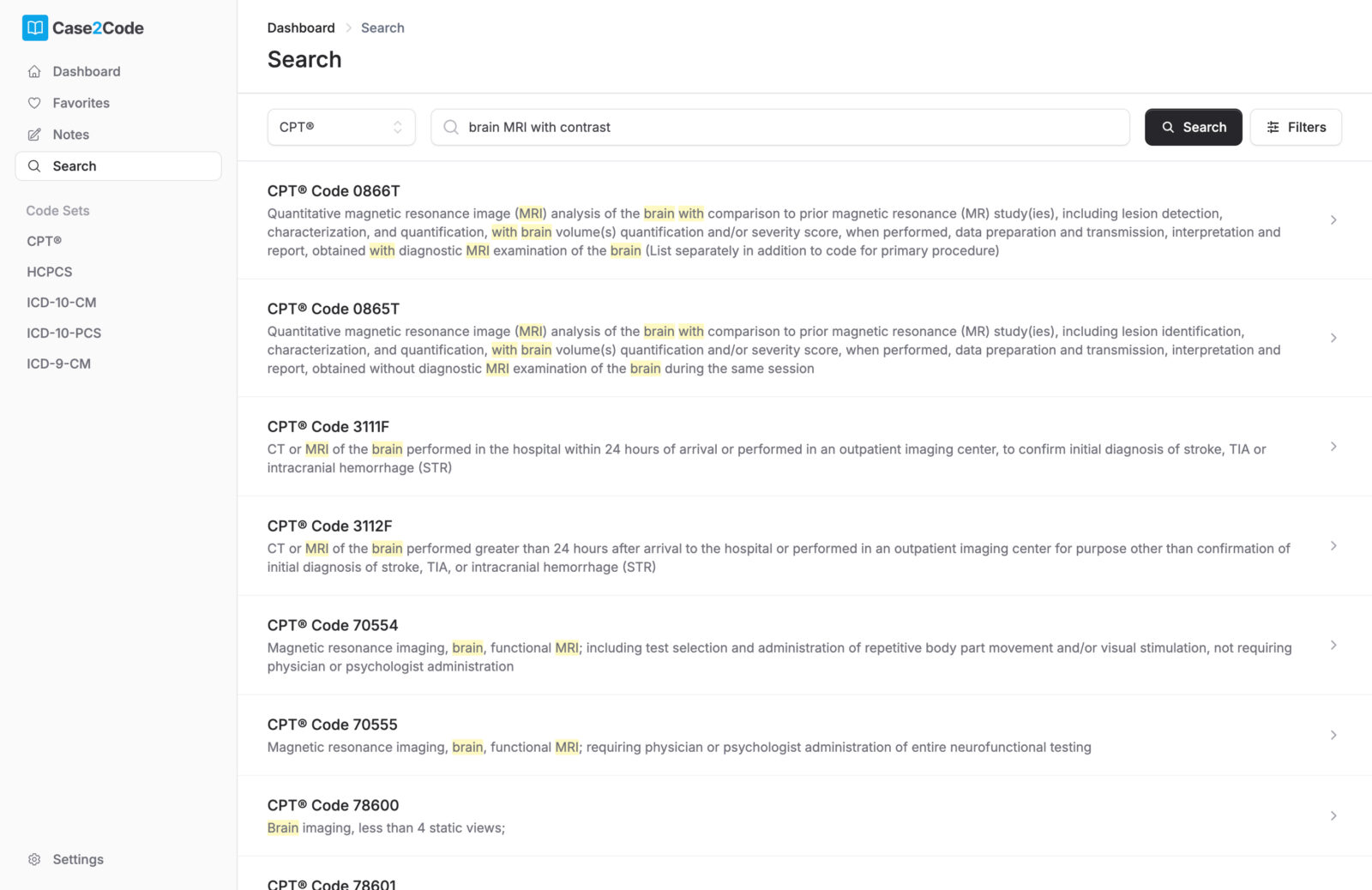Find, Convert & Validate Medical Codes in Seconds
Case2Code makes it easy to search, convert, and verify CPT, ICD-10, and HCPCS codes in seconds. Improve accuracy, reduce errors, and streamline your workflow with the most efficient coding tool available.

Instant Access – No Sign-Up Required
Stop wasting time searching for medical codes manually. Use Case2Code for free and find the codes you need in just a few clicks.
Features
All-in-One Medical Coding Solution
Case2Code provides everything you need to search, validate, and manage medical codes efficiently.
-
Search & Filters
-
Find the exact code you need faster with smart search and filtering options.
-
Lay Term Descriptions
-
Get clear, easy-to-understand explanations for CPT, ICD-10, and HCPCS codes.
-
Crosswalks & Mapping
-
Convert between CPT, ICD-10, and HCPCS codes with seamless cross-referencing.
-
Code Data Insights
-
Access essential details, including billable status, coverage indicators, and related codes.
-
Modifier Assist
-
Ensure proper coding with recommendations on required and applicable modifiers.
-
Notes & Favorites
-
Save important codes and add personal notes for quick reference.
-
History & Updates
-
Track recently searched codes and stay informed with real-time updates.
Trusted by Over 140,000 Medical Professionals & Organizations
Number of Active Monthly Users
- 140,000
Codes in our Databse
- 230,000
Faster Coding Workflows
- 36%
Reduce in Denials
- 42%
How It Works
Find the Right Medical Code in 3 Easy Steps
Case2Code makes medical coding faster and more accurate with an easy-to-use workflow.

- 1. Search for a Code or Keyword
Enter a CPT, ICD-10, or HCPCS code, or use a keyword to find relevant results.
- 2. Filter, Crosswalk & Analyze
Narrow results with filters, view crosswalks for code conversions, and access detailed insights.
- 3. Save, Validate & Apply
Add notes, save favorites, check modifier recommendations, and ensure accuracy before use.
Get a Free Account – No Credit Card Required
Create a free account and access up to 5 searches per day with essential medical coding tools.
Free account
Unlock Free Access to
- All Code Sets
- Search & Filters
- Lay Term Descriptions
- Crosswalk & Mappings
- Code Data Insights
- Modifier Assist
- Notes & Favorites
- History & Updates
Access to all features
Free for life
Register Free AccountOr get a paid plan with unlimited daily views
Common Questions About Case2Code
-
Case2Code is a comprehensive medical coding lookup tool that helps coders, billers, and auditors quickly search, crosswalk, and validate CPT, ICD-10, HCPCS, and other medical codes.
-
Unlike other lookup tools, Case2Code offers real-time updates, smart crosswalks, modifier recommendations, and code history tracking, and new features are constantly being added!
-
Case2Code currently supports:
✔ CPT (Current Procedural Terminology)
✔ ICD-10-CM (Clinical Modification)
✔ ICD-10-PCS (Procedure Coding System)
✔ ICD-9-CM (Clinical Modification)
✔ HCPCS (Healthcare Common Procedure Coding System)Additional code sets will be added soon, including DRG, HCCs, CDT, LOINC, SNOMED CT, and more.
-
Yes! Case2Code follows CMS, AMA, WHO, and other regulatory standards, ensuring that all coding recommendations are accurate and compliant with industry rules.